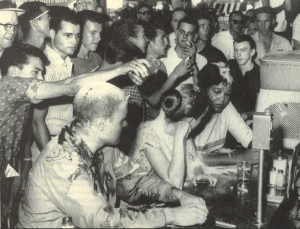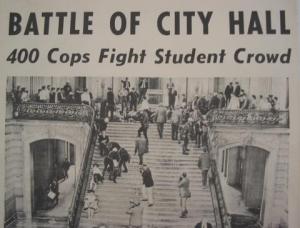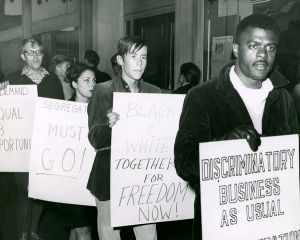He traces his earliest memories of injustice to when he was still in grammar school.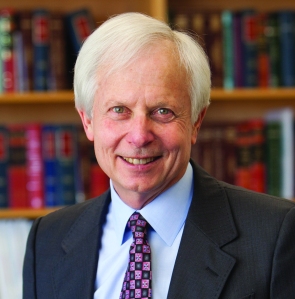
And he has dedicated his life to justice, service, and ensuring future generations are able to do the same.
Professor Jeffrey Brand recently stepped down after 14 years of serving as Dean of the University of San Francisco School of Law. During his tenure as dean, he not only guided the law school through a period of transformative change, he also supported collaborative efforts between the law school and OneJustice, including the Law Student Pro Bono Project. USF law students also participated in the inaugural Justice Bus Trip to the Central Valley in March 2007 and they continue to volunteer for multiple Justice Bus trips every year.
We are very excited to be celebrating Professor Brand and his life-long commitment to justice and service at our July 25th “Opening Doors to Justice” event. We hope very much that you will join us! You can purchase tickets, preview auction items, and donate to support the Justice Bus at the event website.
In the meantime, we caught up with Professor Brand in preparation for the event and posed a couple of questions. Enjoy his answers below!
Why have you committed so much of your professional career to working on access to justice?
I’ve thought about this question a lot over the decades. I trace my earliest memories of injustice to the 1950s when I was still in grammar school. Even then, I had a sense that McCarthyism was a nasty, destructive force in America ruining the lives of innocent people. I recall watching the Army-McCarthy hearings with my parents in our home in Studio City and I recall the great lawyer Joseph’s Welch’s historic, plaintive, rhetorical question to the demagogic junior senator from Wisconsin: “Senator McCarthy, have you no decency, have you no decency?” The YouTub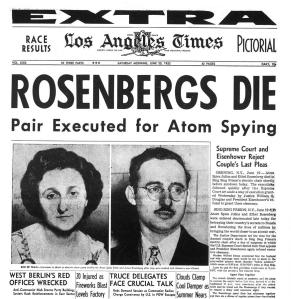 e clip is worth a look: http://www.youtube.com/watch?v=Po5GlFba5Yg
e clip is worth a look: http://www.youtube.com/watch?v=Po5GlFba5Yg
I recall the headlines when Julius and Ethel Rosenberg were executed.
And I recall the heroic acts of Rosa Parks and the great sit in at the Woolworth’s soda fountain in Greensboro, North Carolina when young blacks and their supporters were refused service and taunted and assaulted by whites.
These images led me to read a book when I was in high school called The Student. written by David Horowitz (who much to my amazement later abandoned his leftist roots), describing political activity at UC Berkeley and the great San Francisco demonstrations at San Francisco City Hall against the House Un-American Activities Committee where student protestors were dragged down the steps.
Those images led me to apply to college only at UC Berkeley. It was there that the intensity of my political involvement increased dramatically and my desire to engage in civil rights work became paramount. From 1962-1969, as an undergraduate and as a law student at Cal, we marched, sat in, and worked to overcome injustices that seemed so apparent – restrictions on speech that spawned the Free Speech Movement in 1964 (Mario Savio’s words still move one to this day), racial discrimination as far away as Montgomery, Alabama and as close as restaurants, auto dealers and hotels in the Bay Area that refused to hire African-Americans, and, of course, the expanding war in Vietnam among them – a path that led me to do civil rights work in Jackson, Mississippi the summer after my first year at Boalt.
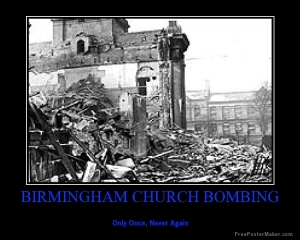 By the time I finished law school, the only work that interested me was work that fed my passion to do good. As I look back, I like to think that my work in legal services, the public defender’s office, with the Agricultural Labor Relations Board (ALRB), as a labor lawyer, and as a law professor and dean, somehow, somewhere along the line made a small difference.
By the time I finished law school, the only work that interested me was work that fed my passion to do good. As I look back, I like to think that my work in legal services, the public defender’s office, with the Agricultural Labor Relations Board (ALRB), as a labor lawyer, and as a law professor and dean, somehow, somewhere along the line made a small difference.
How my career ended up where it did, however, doesn’t really explain why I find public interest work so personally compelling. The reality is that working to enhance access to justice feeds my own personal passions, exciting me daily about my work and motivating me to carry on for all these years.
What is one particularly rewarding experience you have had in your work on access to justice?
I can’t pinpoint any one event. I’ve been blessed to experience so many moments that I hope made a small contribution to increase access to justice, the linchpin of a truly humane and just society – whether it be registering voters in Jackson, Mississippi in the 60s, representing clients in the public defender’s office, resolving disputes between farmworkers and growers as an Administrative Law Judge with the ALRB, representing women and minorities in Title VII class action litigation, or creating opportunities for students to pursue justice from Phnom Penh where they work on war crimes issues to Louisiana where they work against the death penalty to San Francisco where they work on myriad projects, some of them spawned by OneJustice. All of these experiences, in different times and different contexts, have been rewarding in different ways but with a common thread – a sense of fighting the good fight to help promote justice. Engaging in this work over many decades emerges as the most rewarding feeling of all.
What is your favorite part of being a part of the OneJustice network?
My favorite part of being a part of OneJustice is what it does for my law students, the future generations of skilled, ethical professionals who will take up the charge in the struggle for justice. I hope that at the University of San Francisco our students are imbued with a belief that hard work and perseverance can make a difference. I know that my students are excited by the same things that excite me – a sense of involvement in a struggle for the common good. So for me, at this point, my work is as much about future generations as it is about anything.
It’s this concern for future generations that makes OneJustice so critically important. It was a very different time in the 1960s when I graduated from law school. The economy was still expanding and with it the public sector. Law school debt was minimal or non-existent. Jobs were plentiful and the ability to try to do good and to make a living that could sustain one’s self and one’s loved ones not a fantasy. Legal services? The Public Defender’s office? Work with farm workers? It all seemed to be no problem for those of us with those hopes and dreams. Of course, that’s not the case today as rising tuition, crushing debt, a collapsed job market, and a decimated public sector mar the legal professional landscape.
In this context, the importance of OneJustice cannot be overstated. OneJustice provides opportunities for students by helping to shape public interest curricula at law schools, providing internships to quench what I know is the insatiable thirst of today’s law students to pursue justice, and exposing students to the injustice that persists today just as it did 60 years ago when I was a young boy. I always tell students to beware the assassins of the spirit. OneJustice does that in ways that few other organizations do, constantly reminding students of why they came to law school in the first place and creating opportunities in and out of the classroom to realize their dreams. Nothing could be more important. OneJustice reminds us that there will never be too many lawyers in the world who are committed to the pursuit of justice. Just ask a homeless person or an inmate on death row or a family involved in a horrible separation or custody issue. OneJustice promotes the access to justice that society so desperately needs and fuels the hopes and dreams of today’s law students.
Get to know Professor Brand even better in this short video, made when he was dean.
[youtube=http://www.youtube.com/watch?v=0Q5FrBC075k&w=560&h=315]
………………………………………………………………………………..
Thank you, Professor Brand, for your unwavering commitment to promoting justice! We look forward to honoring you and your many accomplishments on Ju ly 25th!
ly 25th!
